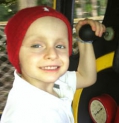Targeting the mTORC1/4E-BP1 axis in Group 4 medulloblastoma

Mentor Name: Vijay Ramaswamy
Medulloblastoma is the most common childhood cancerous brain tumour. Current treatments consist of aggressive surgery followed by radiation to the whole brain and spinal cord, and non-specific chemotherapy. This aggressive therapy results in 60% survival overall, however almost all survivors are left with life-long side effects of their therapy including early death, early strokes, infertility in female survivors and a high rate of government disability claims whereby very few survivors can life an independent life. At relapse however, medulloblastoma is uniformly fatal and hence there is a huge unmet need to find new treatments. Recently we and others have shown that medulloblastoma actually comprises four very different diseases, specifically four subgroups called WNT, SHH, Group 3 and Group 4, of which Group 4 is the most common group at diagnosis and relapse. Unfortunately, personalized therapies have not been identified for relapsed Group 4 medulloblastoma, due primarily to a lack of mutations and models to work with. In order to address this urgent unmet need in neuro-oncology, we have leveraged a novel platform to look at cell signaling from small amounts of tumour, and we analysed primary and recurrent Group 4 medulloblastoma. Strikingly, we found a very specific pathway that is highly activated in relapse Group 4 medulloblastoma compared to other brain tumour types and normal tissue called the mTORC/PI3K pathway. Although this pathway has been evaluated previously, our approach suggests that previous efforts were focusing on the wrong part of the pathway, and as such, our data suggests that this could be a very effective and promising strategy. Our proposal seeks to develop this target further, which we will validate across a panel of Group 4 models. The overall goal of this proposal is to develop mTORC1 inhibition as a rational and promising treatment strategy for recurrent Group 4 medulloblastoma, with the intent of translating our findings into an early phase clinical trial.

